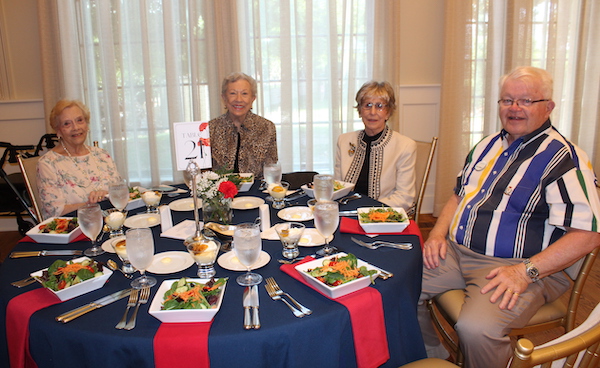Our Community
We are a community founded on uplifting shared values. Our staff and volunteers work to provide the passionate care and spiritual guidance that our values and faith inspire.


Concordia’s Values
We uphold our Christian values while meeting the needs of seniors of all beliefs through a safe, secure and supportive community. This mission informs our dedication to service for all residents living at Concordia.
Be W.I.S.E.
Our values are represented in simple acts of goodwill that provide a consistent, positive impact in our community:
- Wear a smile
- In all things honor God
- Serve others before yourself
- Encourage and bless others
Comfort and City Living
Our location in northwest Oklahoma City is just a stone’s throw away from countless shops, restaurants and local businesses that residents can access from the calm comfort of our 15-acre community.
Benefits of senior living in Oklahoma City include:
-
- A low cost of living (almost 14% below the national average)
- Gorgeous weather and outdoor recreation
- Retiree programs offered by the state’s 50 universities
- Enriching and fun experiences to share with family and friends
- OKC Zoo
- Festival of the Arts
- Myriad Botanical Gardens
- Oklahoma City Museum of Art
- OSU-OKC Farmers Market

Founded in Faith


Ministry Sponsors
Concordia honors the sponsoring ministries aiding our mission in Oklahoma.
LCMS Oklahoma District
www.oklahomalutherans.org
https://www.lcms.org/
Christ Lutheran Church
501 N. Clear Springs Rd, Mustang, OK 73064
Phone: (405) 376-3116
Daniel Ross, Pastor
www.christlutheranmustang.org
Faith Lutheran Church
2512 S. Shartel, Oklahoma City, OK 73109
Phone: (405) 632-5744
Good Shepherd Lutheran Church
700 N. Air Depot, Midwest City, OK 73110
Phone: (405) 732-2585
Ron Simpson, Pastor
https://gslcmwc.com/
Immanuel Lutheran Church
1800 NW 36th St, Oklahoma City, OK 73118
Phone: (405) 525-5793
Clinton McMullin, Pastor
Lutheran Church of Our Savior
6501 NW 23rd St, Bethany, OK 73008
Phone: (405) 495-1605
Gary Rohwer, Pastor
www.oursaviorokc.org
Zion Lutheran Church
7701 West Britton Rd, Oklahoma City, OK 73162
Phone: (405) 722-7472
Ron Christie, Pastor
zionluthokc.360unite.com
Frequently Asked Questions
What Is Concordia’s Mission Statement?
Who Operates Concordia?
Concordia Life Plan Community is owned by Lutheran Senior Citizens, Inc., a 501(c)(3) not-for-profit organization organized with the purpose of providing senior housing and related services in the vicinity of Oklahoma City.
What is Lutheran Senior Citizens, Inc. (LSCI)?
LSCI was organized in 1959 for the purpose of providing senior housing and related services and continues to be committed to meeting the needs of Oklahoma City seniors.
How Does Concordia Help Local Communities?
- Villages OKC
- Senior Living Truth Series Education Partner
- Trash pick-up
- DOH education
- Special Olympics
- Hugs
- The ROC
- Junior League
- OHA
- Parkinson’s Alliance
- Alzheimer’s Association
How Do Concordia’s Mission and Faith Improve the Lives of Residents?
Our spiritual anchor sets our high standards for service. Our staff’s spiritual and moral character compels them to a quality of care that is evident to Concordia residents each and every day.
People With a Passion for Life Planning
Our community is a family, and it wouldn’t be complete without the dedicated members of our staff. Get to know the friendly faces of Concordia’s leadership and board of directors.

7707 W Britton Rd
Oklahoma City, OK 73132
Phone: (405) 331-6113
Toll-Free: 1 (888) 489-0075
Fax: (405) 621-8701
Living Options
Our Community
Becoming a Resident
Foundation
Contact


